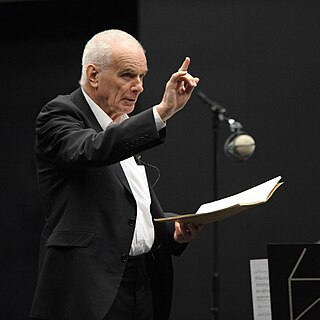
Edward Benjamin Britten, Baron Britten was an English composer, conductor, and pianist. He was a central figure of 20th-century British music, with a range of works including opera, other vocal music, orchestral and chamber pieces. His best-known works include the opera Peter Grimes (1945), the War Requiem (1962) and the orchestral showpiece The Young Person's Guide to the Orchestra (1945).

The War Requiem, Op. 66, is a large-scale setting of the Requiem composed by Benjamin Britten mostly in 1961 and completed in January 1962. The War Requiem was performed for the consecration of the new Coventry Cathedral, which was built after the original fourteenth-century structure was destroyed in a World War II bombing raid. The traditional Latin texts are interspersed, in telling juxtaposition, with extra-liturgical poems by Wilfred Owen, written during World War I.

Sir Peter Neville Luard Pears was an English tenor. His career was closely associated with the composer Benjamin Britten, his personal and professional partner for nearly forty years.

Stuart Oliver Knussen was a British composer and conductor.

Sir Peter Maxwell Davies was an English composer and conductor, who in 2004 was made Master of the Queen's Music.
Robert Tear, CBE was a Welsh tenor singer, teacher and conductor. He first became known singing in the operas of Benjamin Britten in the mid-1960s. From the 1970s until his retirement in 1999 his main operatic base was the Royal Opera House, Covent Garden; he appeared with other opera companies in the UK, mainland Europe, the US and Australia. Generally avoiding the Italian repertoire, which did not suit his voice, Tear became known in leading and character roles in German, British and Russian operas.

Osian Gwynn Ellis was a Welsh harpist, composer and teacher. He was principal harpist of the London Symphony Orchestra, a founding member of the Melos Ensemble, and a harp teacher at the Royal Academy of Music. Many composers wrote music for him. From 1959 onwards, Ellis had a close professional partnership with Benjamin Britten that lasted to the latter's death. He often first performed and recorded Britten's works.

Philip Gordon Langridge was an English tenor, considered to be among the foremost exponents of English opera and oratorio.
Donald Charles Peter Mitchell CBE was a British writer on music, particularly known for his books on Gustav Mahler and Benjamin Britten and for the book The Language of Modern Music, published in 1963.
Sir Philip Stevens Ledger, CBE, FRSE was an English classical musician, choirmaster and academic, best remembered as Director of the Choir of King's College, Cambridge in 1974–1982 and of the Royal Scottish Academy of Music and Drama from 1982 until he retired in 2001. He also composed choral music and played the organ, piano and harpsichord.
This is a summary of 1958 in music in the United Kingdom, including the official charts from that year.
Huw Thomas Watkins is a British composer and pianist. Born in South Wales, he studied piano and composition at Chetham's School of Music in Manchester, where he received piano lessons from Peter Lawson. He then went on to read music at King's College, Cambridge, where he studied composition with Robin Holloway and Alexander Goehr, and completed an MMus in composition at the Royal College of Music, where he studied with Julian Anderson. Huw Watkins was awarded the Constant and Kit Lambert Junior Fellowship at the Royal College of Music, where he used to teach composition. He is currently Honorary Research Fellow at the Royal College of Music.
Lisa Jane Tyrrell is an English operatic soprano.
Martin Owen is a British classical horn player. He studied at the Royal Academy of Music. He was principal horn of the Royal Philharmonic Orchestra (RPO) 1998–2008. In 2008, he was appointed principal horn of the BBC Symphony Orchestra.
Iestyn Davies is a British classical countertenor.
Graeme Peter Crump, known professionally as Peter Graeme and as 'Timmy' Crump to friends and family, was an English oboist and academic teacher. He was best known as the principal oboist of the Melos Ensemble.
Ian Partridge is a retired English lyric tenor, whose repertoire ranged from Monteverdi, Bach and Handel, the Elizabethan lute songs, German, French and English songs, through to Schoenberg, Weill and Britten, and on to contemporary works. He formed a renowned vocal-piano duo with his sister Jennifer Partridge, with whom he worked for over 50 years. While concentrating mainly on songs, oratorio and lieder, he also recorded opera, and has an extensive discography. He is now a teacher and adjudicator, and conducts master classes in many countries.
Les Illuminations, Op. 18, is a song cycle by Benjamin Britten, first performed in 1940. It is composed for soprano or tenor soloist and string orchestra, and sets verse and prose poems written in 1872–1873 by Arthur Rimbaud, part of his collection Les Illuminations.
Our Hunting Fathers, Op. 8, is an orchestral song-cycle by Benjamin Britten, first performed in 1936. Its text, assembled and partly written by W. H. Auden, with a pacifist slant, puzzled audiences at the premiere, and the work has never achieved the popularity of the composer's later orchestral song-cycles, Les Illuminations, the Serenade for Tenor, Horn and Strings and the Nocturne.






